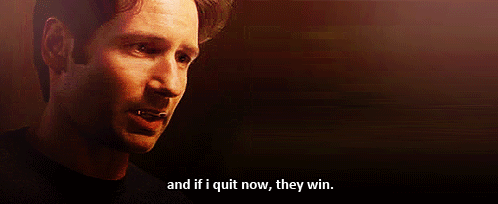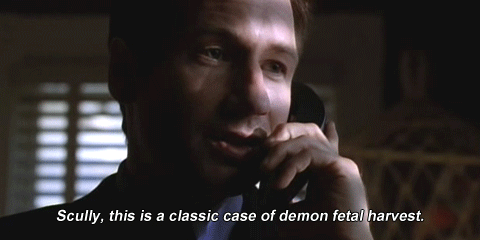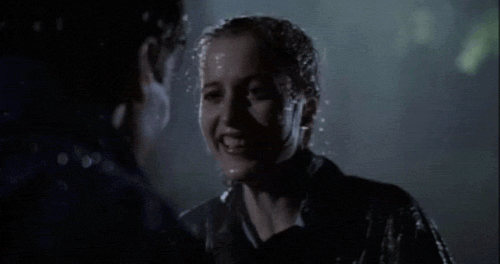

The X-Files meant so much to me as a kid. I was constantly changing schools and pop culture became my constant. This show became a constant. I remember writing “I LOVE THE X-FILES” over and over again on my Tech Ed. folder like the total and complete TV nerd that I was/am. My sister and I would stay up late talking about our favorite episodes and quotes. That passion for storytelling and for shows like this was a way to explore the world outside of my own narrow experience of it. I traveled across America with Mulder and Scully and learned about friendship and love and faith and aliens and Americana, even if it was just a representation of these things. Because representations have their own power, separate from “real” life, and exploring the country through The X-Files was more than I was getting in rural, smalltown American where I felt a sense of powerless in regards to my insatiable curiosity.

Today, I am a professional TV writer. I get to gush about these shows and (sometimes) get paid for it and that is a dream that was borne of shows like The X-Files. I truly believe that television is the medium of our time — which, is to say, it has immense power to not only reflect culture, but to shape it by challenging the flawed status quo. It’s ability to come into our homes and tell serialized, character-driven narratives has unbelievable power. The X-Files wasn’t doing anything crazy with its exploration of American culture, but it’s mistrust of government and its glorification of the quest for truth are still so relevant today. The X-Files is still relevant today.

Beyond any thematic cultural contributions, The X-Files is recognized as one of the first shows to use a mixture of arc-based and monster-of-the-week storytelling, a structure that is still used today. It was one of the first shows to develop an online fandom, a community that is taken for granted today and has grown into such an incredible way of exploring the narratives we love. Through fandom, we are given agency in exploring the stories we love. Even if we don’t get to be the storytellers in the more traditional way, we become the storytellers through fanvids, fanart, fanfic, meta, etc. Though fandom is still a somewhat stigmatized way of engaging with stories, it is no less valid than the people who have the resources and privilege to tell these stories — and don’t let anybody tell you different.

The fandom term “shipper” came out of The X-Files fandom, vernacular that has become commonplace when discussing TV today. This is important, too. As the creator of a TV site called TV Feels, I obviously think a lot about emotional resonance in storytelling. I think about it a lot in relation to gender dynamics, how the more traditionally masculine way of moving through the world — i.e. stoically, with displays of emotion a weakness — is reflected in our understanding of what makes good TV. The “best” TV, as determined by a critic base skewed white, male, middle-aged, and of certain class, reflects these traditionally masculine values. Often, characters like Walter White or Don Draper are represented as the end-all and be-all of prestige TV, the characters who make this a golden age of television. And, yes, these characters and the shows they come from are great. But they represent a very specific form of storytelling. The more melodramatic, the more feelings-based TV shows, the ones traditionally coded as feminine, are then delegated to the “guilty pleasure” category. We watch them, but all too often with a qualification attached. All too often apologizing for the way these shows shine with emotion, rather than celebrating it.

The thing is: this is changing. Sure, anti-hero tales are still considered the “best” TV has to offer by many, but even those who prefer the anti-hero tale are making room. There is another conversation taking place, too. A conversation about other kinds of TV and other kinds of characters and other kinds of storytelling. A discussion and promotion of emotional resonance as a primary motivator, as an overt part of the storytelling rather than a secondary motivator. I’m not saying that The X-Files falls into that latter category or, really, that there are distinct categories. Because so much of this discussion refers not to the text of the television show itself, but from the ways in which people engage with it. Some shows have more potential for these feels-based fandom than others. And that’s one of the things that sets The X-Files apart, that’s one of the things that makes it so important in television (and storytelling) history: through the creation of an online fandom, it allowed fans to find validity and support in a different way of TV-watching. In an unapologetically feels-based way of engaging with story. In a way that didn’t necessitate a qualifier or an excuse. Also, Dana Scully is a badass.

I’m not sure if The X-Files revival will be able to live up to that legacy. It’s probably not possible. Its original incarnation came at a very unique television time. But that doesn’t lessen my excitement for this show’s return. The fifth-grader with the “I LOVE THE X-FILES” folder inside of me wouldn’t have it any other way. She feels too much. No, that’s wrong… She feels as much as she wonderfully should.
 Are you excited about The X-Files revival? Are you a feels-based fan? Why or why not? Sound off in the comments below!
Are you excited about The X-Files revival? Are you a feels-based fan? Why or why not? Sound off in the comments below!
Note: The above gifs are not mine. In the excitement, I couldn’t wait to post this. I will go back and look for the sources, but — if they belong to you — please let me know and I will link back to the source. Thanks!





Leave a Reply